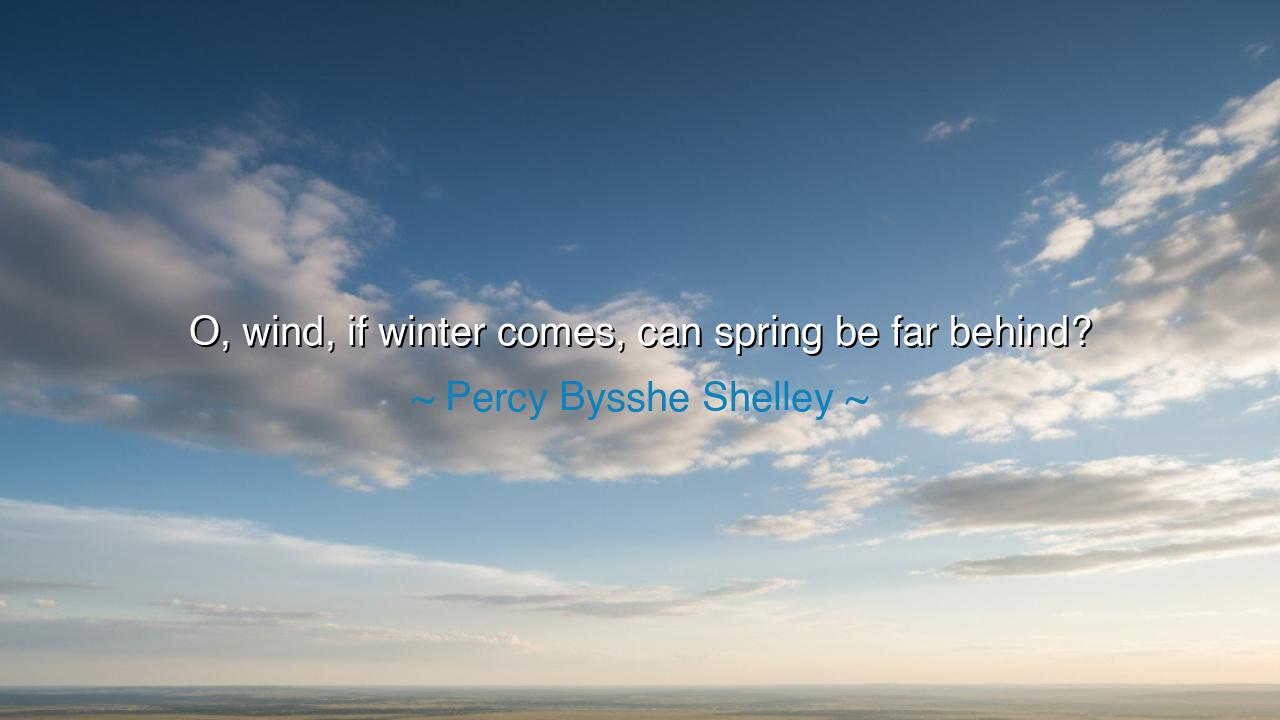
O, wind, if winter comes, can spring be far behind?






Hear the immortal words of Percy Bysshe Shelley, poet of fire and storm, who cried out: “O, wind, if winter comes, can spring be far behind?” These words, taken from his Ode to the West Wind, are not mere verses of nature’s change, but a hymn of hope, born from despair. For in them Shelley binds the destiny of the seasons to the destiny of the soul, reminding us that no winter of hardship, no cold of sorrow, can endure forever. The spring, bearer of renewal, waits beyond the frost, and it shall not be denied.
The wind Shelley invokes is no gentle breeze, but the tempest, the destroyer, the bringer of autumn’s death. It sweeps leaves from the trees, scatters seeds into the soil, and heralds the coming of the barren winter. Yet Shelley does not despair in its violence. Instead, he beholds within its fury the promise of rebirth. For if the winter is certain, so too is the spring. Death and life, sorrow and joy, despair and hope—they are twined together, bound by the eternal law of renewal.
This truth has been proven across history. Recall the dark winter of Valley Forge during the American Revolution. Washington’s army lay starving, barefoot, near defeat, the bitter cold their cruelest enemy. Yet beyond that suffering rose the spring of renewed strength. When the snows melted, the soldiers, tempered by hardship, marched forth with fiercer resolve. Out of their winter was born a victory that shaped a nation. So Shelley’s words remind us: endure the frost, for the green shoots of triumph are already stirring beneath it.
Consider, too, the fate of Nelson Mandela. Cast into prison for twenty-seven years, he endured a long and bitter winter of chains and silence. Yet he did not let the cold extinguish the fire within. And when his release came, it was like the blossoming of spring after unending night. He rose not as a broken man but as a symbol of reconciliation, leading South Africa into new life. His story proves the truth of Shelley’s vision: that beyond the coldest winters of injustice, a spring of freedom can still dawn.
The meaning of this saying is not only that time brings change, but that change itself is the seed of hope. Just as the earth does not freeze forever, the soul does not suffer without end. Each hardship is but a season, and every season carries within it the promise of its opposite. The deeper the winter, the more radiant the spring. This is the law of the universe, written into the cycles of nature and the journeys of men.
The lesson is clear: despair not in the dark hours of life. When the storms batter you, when cold winds strip you bare, remember that beneath the soil of your suffering lies the seed of renewal. No sorrow lasts forever; no defeat is final. Life, like the seasons, turns. To lose hope is to forget the eternal promise of spring. To hold hope is to endure until the blossoms return.
What, then, are the practical actions? When you face your winter, do not surrender to despair. Instead, prepare for spring—nurture your inner strength, plant seeds of kindness and patience, believe in the cycle of renewal. Surround yourself with reminders of growth: the words of poets, the wisdom of the past, the simple beauty of nature. And when others walk through their winters, be their messenger of hope, whispering Shelley’s words into their hearts: “If winter comes, can spring be far behind?”
Thus, Shelley’s cry is not only the song of a poet but the eternal anthem of humanity. The wind may roar, the winter may come, but the spring is always near. Hold fast, O soul, for the blossoms are already budding beyond the frost. And when they bloom, you shall see that every winter was but the dark preparation for a brighter dawn.






AAdministratorAdministrator
Welcome, honored guests. Please leave a comment, we will respond soon